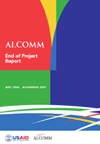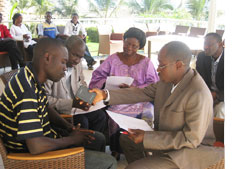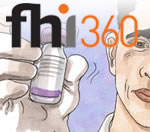continued from home page
Ready. Camera. Action!
AFENET Field Epidemiologists Hone Their Communication Skills
The workshops, held in Dar es Salaam, Tanzania, on June 24-25 and July 21-22, 2011 were designed to strengthen the skills of professionals that are not primarily communication experts. The 14 participants were selected because they often serve as their ministries’ spokespeople in press conferences, debriefings, investigations, and seminars.
The June workshop on Applied Communication combined classroom work with on-camera experience. Understanding what needs to go into an effective communication response is one part of good communication. Applying it is the other. The participants had the opportunity to practice on camera and to apply what they learned. Elements they needed to consider were who the target audience is, what evidence and other data exist how are people hearing my voice, and what do I say. On-camera experience allowed the public health experts to actually apply these techniques to different communication simulations. Using the recent Ebola virus outbreak in Uganda as the primary case study, the workshop drew on the field experience of Dr. Monica Musenero, epidemiologist for the AFENET Secretariat and Ministry of Health, Uganda, who led the government’s response to Ebola. She provided details about the on-the-ground situation that helped in crafting messages and responses. Other public health situations that were discussed as examples were polio vaccinations in Northern Nigeria, the Marburg virus in Uganda, and avian influenza globally.
The second two-day workshop in July used what was learned from the Applied Communication to plan for and respond to emergency or risk situations. The workshop, Risk Communication, combined media coaching with communication planning for an emergency or high-risk situation. The two-day meeting began with “ambush interviews” of three participants, or interviews for which they did not have an opportunity to prepare. After an analysis and critique of these ambush interviews, the workshop introduced the participants to the often-alien-seeming world of the news media. The field epidemiologists spent time practicing on camera, as well as off camera, discussing and diagramming successful and not-as-successful broadcast interviews including the U.S. response to the H1N1 influenza vaccine. Case studies used for this session were Marburg virus and Rift Valley fever.
A four-day combined course will be held in Dar es Salaam in September for francophone AFENET members from West Africa.
The training guide and presentations used during the workshops are posted here. Facilitators for these two events were communication experts from the USAID-funded PREVENT Project, managed by FHI360.
continued from home page
Philippines H1N1 Vaccination Campaign: Using Mobile Phone Technology
The real-time and longitudinal nature of the data means that program planners can use the data to correct implementation issues during rollout rather than the more typical “lessons learned” which can only benefit later programs. The technology is simple and rapid: following a short training session, an SMS notice was sent to participants’ phones, and they provided their field-based observations on a regular, weekly basis. Data was quickly quality checked and sent to a client “dashboard” for near real-time analysis and used to determine communication needs to further campaign activities. In future, AED plans to use the methodology among other “front-line” audiences such as village leaders, health workers, veterinarians and others to provide managers with rapid real-time feedback and monitoring of field implementation issues.
H1N1 Vaccination SMS Monitor Wave Reports (PPTX).
continued from home page
AI.COMM End of Project Report - May 2006-November 2009
 For the last 5 years, AED has been involved as a key partner in the U.S. government's efforts to plan for and respond to pandemics, providing leadership in behavior change and communication for non-pharmaceutical interventions and in promoting, training, and mobilizing at-risk audiences for the deployment of H1N1 pandemic influenza vaccines. The AI.COMM End of Project Report (PDF) (e-magazine) captures our accomplishments and lessons learned under AI.COMM -- from formative research and monitoring and evaluation, to implementation of integrated communication programs to capacity building to forging and maintaining partnerships.
For the last 5 years, AED has been involved as a key partner in the U.S. government's efforts to plan for and respond to pandemics, providing leadership in behavior change and communication for non-pharmaceutical interventions and in promoting, training, and mobilizing at-risk audiences for the deployment of H1N1 pandemic influenza vaccines. The AI.COMM End of Project Report (PDF) (e-magazine) captures our accomplishments and lessons learned under AI.COMM -- from formative research and monitoring and evaluation, to implementation of integrated communication programs to capacity building to forging and maintaining partnerships.
continued from home page
Field Epidemiology Training - Applied Communication Skills
 AED in partnership with the West Africa office of Africa Field Epidemiology Network (AFENET) conducted a two-day training in Dakar, Senegal on Applied Communication Skills for Field Epidemiologists. Senior representatives from four countries - Burkina Faso, Mali, Niger, and Togo as well as representatives from the government of Senegal's Ministry of Health participated in the training that focused on skills related to listening to the public; creating actionable recommendations and talking points; and communicating with select audiences including the media. Two journalists from Senegal also attended and assisted with the third component on talking with the media.
AED in partnership with the West Africa office of Africa Field Epidemiology Network (AFENET) conducted a two-day training in Dakar, Senegal on Applied Communication Skills for Field Epidemiologists. Senior representatives from four countries - Burkina Faso, Mali, Niger, and Togo as well as representatives from the government of Senegal's Ministry of Health participated in the training that focused on skills related to listening to the public; creating actionable recommendations and talking points; and communicating with select audiences including the media. Two journalists from Senegal also attended and assisted with the third component on talking with the media.
Attendees include Dr. Kandioura Toure (Mali), Dr. Souley Rabi Maïtournam (Niger) and Kafechina Litorga (Togo). Dr. Yaya Drabo, AED behavior change and communication advisor, conducted the training and Julien Denakpo, Africa coordinator for Avian and Pandemic Influenza, coordinate the activity. Dr. Ousmane Badolo, AFENET West Africa Program Officer and his staff in Burkina Faso organized the event for AFENET. The training was held on 15 and 16 February 2010.
Training materials in English and French.
continued from home page
H1N1 Pandemic Influenza Vaccine Deployment: Training of Trainers in Cambodia

AED conducted the first of several country-specific training activities in Cambodia to support the H1N1 pandemic influenza vaccine deployment. During the week of February 22, 2010, Dr. Cecile Lantican trained more than 70 government trainers from 24 provinces in interpersonal communication and counseling techniques. The communication training consisted of background information on the virus, the communication materials to be used by health care workers, and role playing of counseling and answer specific questions about the vaccine and the virus.
The master trainers will return to their provinces to train health care workers in this communication component of the vaccine activity. All the materials used in the training are available on this web site. The master training program was part of a two-day training on all aspects of the deployment, led by Peter Vanquaille, WHO consultant for logistics management and Dr. Chneng Mom from the Ministry of Health presented information on H1N1 virus.
| 
